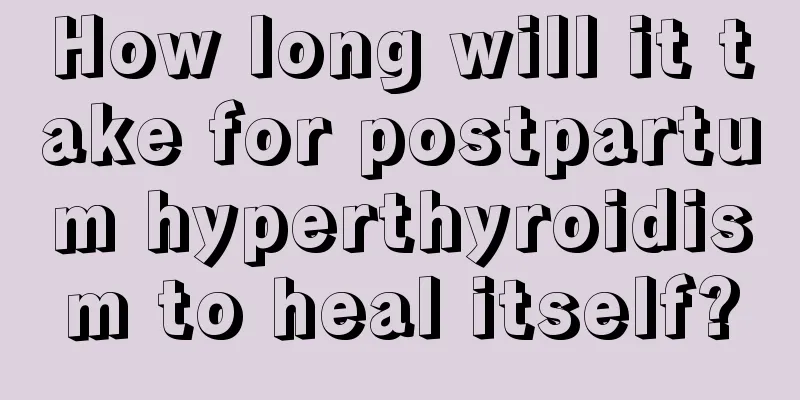How long will it take for postpartum hyperthyroidism to heal itself?

|
Many women will suffer from hyperthyroidism when they are pregnant. We all know that hyperthyroidism is very harmful. If hyperthyroidism is not controlled within the normal range in time, it will affect the growth and development of the baby. Therefore, if you suffer from hyperthyroidism during pregnancy, you must take medication under the guidance of a doctor. Many women are worried that they will still have hyperthyroidism after giving birth. How long will it take for hyperthyroidism to heal itself after childbirth? Postpartum hyperthyroidism is a disease of the mother's own thyroid gland, which is mainly caused by abnormal maternal thyroid function. In fact, the incidence of postpartum hyperthyroidism is between 5% and 10%, and it usually occurs in about 1 to 7 months. Since many of them are one-time or painless, patients with mild symptoms can heal themselves and will be relieved within a year. Postpartum hyperthyroidism usually has an acute onset and the symptoms are not particularly obvious. The thyroid hormone level can be tested to observe whether it is first or second degree. Postpartum hyperthyroidism with slightly more severe symptoms can be treated with medication according to the severity of the symptoms. However, 25% to 40% of patients are more likely to relapse when they become pregnant again. Therefore, once you discover that you have postpartum hyperthyroidism, you still need to go to the hospital for a systematic examination. How to care for postpartum hyperthyroidism First of all, it is very important for mothers to maintain a good mentality. They can listen to music regularly or go out for a walk to make their mood happy. In addition, even if you suffer from postpartum hyperthyroidism, you must have an open mind and have the optimism and strong confidence to overcome the disease. Secondly, you can also adjust your diet. For example, you can eat some seaweed and radish soup, bergamot porridge, green tomato cake, and animal offal such as chicken liver and duck liver. Try to eat less raw, cold, and greasy food, and avoid spicy food. If you have postpartum hyperthyroidism, don't be overly nervous or afraid. In your daily life, you can go out for more exercise, especially in the morning, and breathe fresh air, which is more beneficial to our health. Symptoms of postpartum hyperthyroidism 1. First of all, 25% to 42% of mothers will experience transient hypothyroidism and occasional blurred vision. About 50% of people will discover this about 1 to 3 months after giving birth, and it lasts for about 1 to 2 months. 2. If you experience edema, unexplained weight gain, and loss of appetite 3 to 6 months after giving birth, you may have postpartum hyperthyroidism. 3. Some patients may also experience amenorrhea or uterine bleeding, and the incidence of depression in some women with positive thyroid antibodies will increase by about 8% to 30%. Of course, most patients will return to normal within 5 to 10 months after delivery. |
<<: What to do if you have stomach pain and diarrhea during pregnancy
>>: Why do I always have stomach pain during pregnancy?
Recommend
How to clear milk clots during lactation
Milk clots are common during lactation, but we al...
What caused the mysterious "strange disease" that appeared in Japan in the 1950s?
In the 1950s, the villagers of Minamata Village i...
What to do if pregnant women have allergies
I believe that many people have experienced skin ...
Is it normal to bleed after using Baofukang?
There are many medicines used to treat gynecologi...
How long does it take to get menstruation after a painless abortion?
In modern life, many young female friends suffer ...
Among the antihypertensive drugs, can pril, sartan and lolamine be used together?
A friend told Huazi that he had been using two an...
What does the HPV nine-valent vaccine prevent?
The HPV family is very large, with more than 100 ...
Detailed explanation of the reasons and benefits of green eye protection!
People always feel visual fatigue after using the...
Have you ever experienced back pain?
Have we ever encountered such a situation many ti...
What should I do if I have freckles on my face during breastfeeding?
Many women have some small freckles on their face...
Beware! These are all recognized first-class carcinogens! They are hard to detect, and you may have them in your home...
This article was reviewed by Pa Li Ze, chief phys...
Uterine fibroids 6cm pregnancy
Uterine fibroids are a common type of tumor among...
The menstrual flow is small and I feel like it can't come out
Some people have their periods but their menstrua...
The silent killer, COPD, these high-risk groups must be careful!
COPD is a common chronic airway disease Also know...









